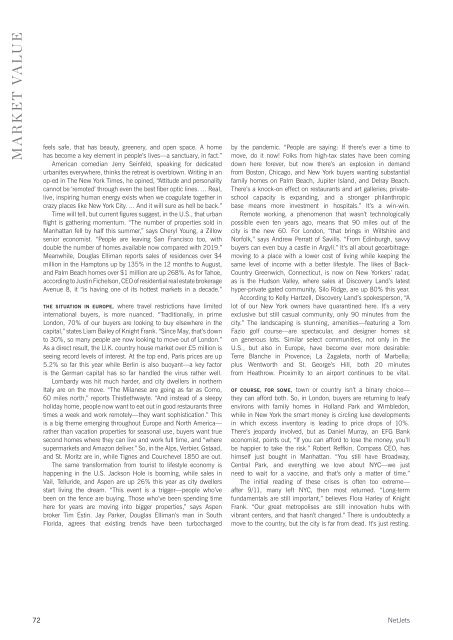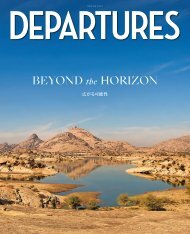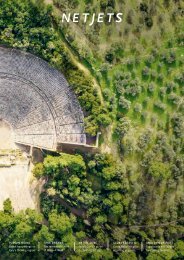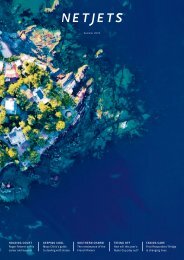NETJETS US VOLUME 12 2020
Create successful ePaper yourself
Turn your PDF publications into a flip-book with our unique Google optimized e-Paper software.
MARKET VALUE<br />
feels safe, that has beauty, greenery, and open space. A home<br />
has become a key element in people’s lives—a sanctuary, in fact.”<br />
American comedian Jerry Seinfeld, speaking for dedicated<br />
urbanites everywhere, thinks the retreat is overblown. Writing in an<br />
op-ed in The New York Times, he opined, “Attitude and personality<br />
cannot be ‘remoted’ through even the best fiber optic lines. ... Real,<br />
live, inspiring human energy exists when we coagulate together in<br />
crazy places like New York City. ... And it will sure as hell be back.”<br />
Time will tell, but current figures suggest, in the U.S., that urban<br />
flight is gathering momentum. “The number of properties sold in<br />
Manhattan fell by half this summer,” says Cheryl Young, a Zillow<br />
senior economist. “People are leaving San Francisco too, with<br />
double the number of homes available now compared with 2019.”<br />
Meanwhile, Douglas Elliman reports sales of residences over $4<br />
million in the Hamptons up by 135% in the <strong>12</strong> months to August,<br />
and Palm Beach homes over $1 million are up 268%. As for Tahoe,<br />
according to Justin Fichelson, CEO of residential real estate brokerage<br />
Avenue 8, it “is having one of its hottest markets in a decade.”<br />
THE SITUATION IN EUROPE, where travel restrictions have limited<br />
international buyers, is more nuanced. “Traditionally, in prime<br />
London, 70% of our buyers are looking to buy elsewhere in the<br />
capital,” states Liam Bailey of Knight Frank. “Since May, that’s down<br />
to 30%, so many people are now looking to move out of London.”<br />
As a direct result, the U.K. country house market over £5 million is<br />
seeing record levels of interest. At the top end, Paris prices are up<br />
5.2% so far this year while Berlin is also buoyant—a key factor<br />
is the German capital has so far handled the virus rather well.<br />
Lombardy was hit much harder, and city dwellers in northern<br />
Italy are on the move. “The Milanese are going as far as Como,<br />
60 miles north,” reports Thistlethwayte. “And instead of a sleepy<br />
holiday home, people now want to eat out in good restaurants three<br />
times a week and work remotely—they want sophistication.” This<br />
is a big theme emerging throughout Europe and North America—<br />
rather than vacation properties for seasonal use, buyers want true<br />
second homes where they can live and work full time, and “where<br />
supermarkets and Amazon deliver.” So, in the Alps, Verbier, Gstaad,<br />
and St. Moritz are in, while Tignes and Courchevel 1850 are out.<br />
The same transformation from tourist to lifestyle economy is<br />
happening in the U.S. Jackson Hole is booming, while sales in<br />
Vail, Telluride, and Aspen are up 26% this year as city dwellers<br />
start living the dream. “This event is a trigger—people who’ve<br />
been on the fence are buying. Those who’ve been spending time<br />
here for years are moving into bigger properties,” says Aspen<br />
broker Tim Estin. Jay Parker, Douglas Elliman’s man in South<br />
Florida, agrees that existing trends have been turbocharged<br />
by the pandemic. “People are saying: If there’s ever a time to<br />
move, do it now! Folks from high-tax states have been coming<br />
down here forever, but now there’s an explosion in demand<br />
from Boston, Chicago, and New York buyers wanting substantial<br />
family homes on Palm Beach, Jupiter Island, and Delray Beach.<br />
There’s a knock-on effect on restaurants and art galleries; privateschool<br />
capacity is expanding, and a stronger philanthropic<br />
base means more investment in hospitals.” It’s a win-win.<br />
Remote working, a phenomenon that wasn’t technologically<br />
possible even ten years ago, means that 90 miles out of the<br />
city is the new 60. For London, “that brings in Wiltshire and<br />
Norfolk,” says Andrew Perratt of Savills. “From Edinburgh, savvy<br />
buyers can even buy a castle in Argyll.” It’s all about geoarbitrage:<br />
moving to a place with a lower cost of living while keeping the<br />
same level of income with a better lifestyle. The likes of Back-<br />
Country Greenwich, Connecticut, is now on New Yorkers’ radar,<br />
as is the Hudson Valley, where sales at Discovery Land’s latest<br />
hyper-private gated community, Silo Ridge, are up 80% this year.<br />
According to Kelly Hartzell, Discovery Land’s spokesperson, “A<br />
lot of our New York owners have quarantined here. It’s a very<br />
exclusive but still casual community, only 90 minutes from the<br />
city.” The landscaping is stunning, amenities—featuring a Tom<br />
Fazio golf course—are spectacular, and designer homes sit<br />
on generous lots. Similar select communities, not only in the<br />
U.S., but also in Europe, have become ever more desirable:<br />
Terre Blanche in Provence; La Zagaleta, north of Marbella;<br />
plus Wentworth and St. George’s Hill, both 20 minutes<br />
from Heathrow. Proximity to an airport continues to be vital.<br />
OF COURSE, FOR SOME, town or country isn’t a binary choice—<br />
they can afford both. So, in London, buyers are returning to leafy<br />
environs with family homes in Holland Park and Wimbledon,<br />
while in New York the smart money is circling luxe developments<br />
in which excess inventory is leading to price drops of 10%.<br />
There’s jeopardy involved, but as Daniel Murray, an EFG Bank<br />
economist, points out, “If you can afford to lose the money, you’ll<br />
be happier to take the risk.” Robert Reffkin, Compass CEO, has<br />
himself just bought in Manhattan. “You still have Broadway,<br />
Central Park, and everything we love about NYC—we just<br />
need to wait for a vaccine, and that’s only a matter of time.”<br />
The initial reading of these crises is often too extreme—<br />
after 9/11, many left NYC, then most returned. “Long-term<br />
fundamentals are still important,” believes Flora Harley of Knight<br />
Frank. “Our great metropolises are still innovation hubs with<br />
vibrant centers, and that hasn’t changed.” There is undoubtedly a<br />
move to the country, but the city is far from dead. It’s just resting.<br />
72 NetJets


















